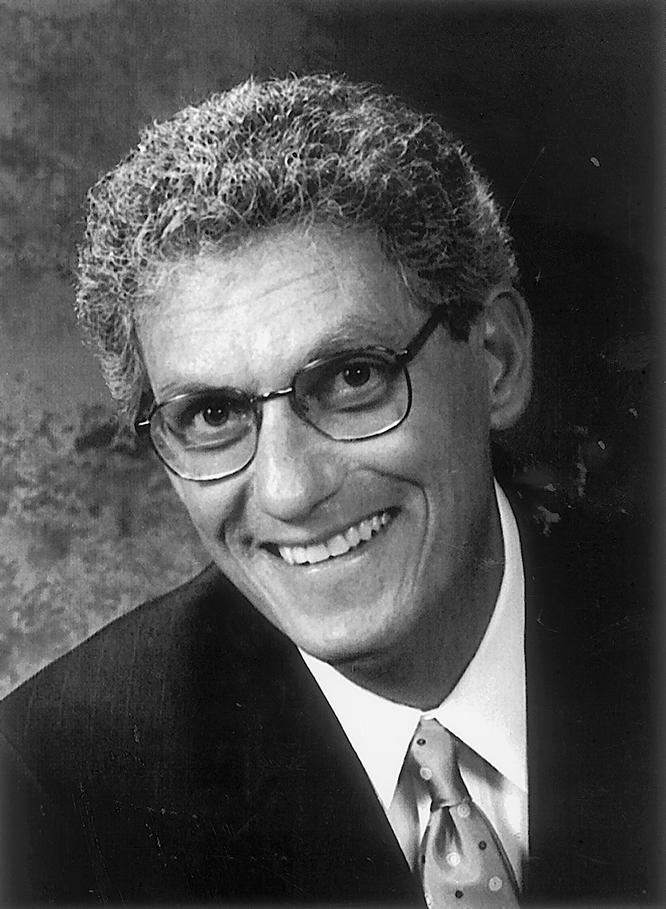Joel J. Roslyn, 48, Chairman of the Department of Surgery at Allegheny College of Medicine in Philadelphia, died on July 4, 1999, at home in the company of his loving wife, Priscilla, and their four teenage sons. FIGURE

Figure. Joel J. Roslyn, MD
He was born in Flushing, New York, attended John Bown High School, was Phi Beta Kappa at Union College, was elected to Alpha Omega Alpha at Albany Medical College, and completed his surgical internship and residency at the University of California, Los Angeles. He established himself as a researcher in the field of biliary tract disease during a research fellowship in surgical gastroenterology, and was awarded the Resident’s Prize from the Society of Surgery of the Alimentary Tract in 1979, and from the Association for Academic Surgery in 1980.
After completing his training in 1982, Joel continued at UCLA, becoming an Associate Professor in the Department of Surgery in 1987. It was during these years that he really came into his own as a nationally and internationally respected surgeon, author, teacher, and academic leader. His particular interest was biliary tract disease. He developed a large clinical practice in pancreatic and hepatobiliary surgery in Los Angeles and then in Philadelphia. His clinical interests were mirrored by his scholarly pursuits in the pathophysiology of gallstones. He had continuous peer-reviewed funding for his research from the Veterans Administration and the National Institutes of Health from 1980 until his death.
Considering his relatively young age, Joel was held in high esteem even by his senior colleagues. He was a Director of the American Board of Surgery at age 44, and was President-Elect of the Philadelphia Academy of Surgery. In 1990, Joel’s peers and colleagues elected him President of the Association for Academic Surgery. He also served as President of the Society of University Surgeons in 1995 and was the American representative for the Collegium Internationale Chirurgie Digestivae. At the time of his death, Joel was an active member of the editorial boards of Annals of Surgery, Archives of Surgery, and HPB: Journal of the International Hepato-Pancreatic Biliary Association.
Impressive as they are, these awards and distinctions cannot even begin to describe the person that was Joel Roslyn. Everyone who knew him was struck by his openness and compassion, his comforting eyes, and ever-present smile. Whether it was on the basketball court coaching his sons, in the operating room, or at the family dinner table, he always exuded a sense of peace and calm. He was an incredibly positive influence on his family, his friends, his students, his patients, and his peers. One of the little-known facts about Joel was that he was born deaf in one ear. For a man with only partial hearing, however, he was a remarkably good listener.
The tragedy of Joel’s untimely death began the year before he was diagnosed with melanoma. Last December, he had just succeeded in rescuing the Allegheny School of Medicine from being a casualty of the financial woes of Allegheny University. Throughout the entire bankruptcy fiasco, he was loyal to his students and faculty, many of whom followed him from Los Angeles to work under his tutelage. While many people in similar positions at Allegheny left for jobs elsewhere, and he himself had many opportunities to leave, Joel remained steadfast, working to salvage the sinking ship. Characteristically, his primary concern was the welfare of his students, residents, and faculty, rather than himself. It was during this turbulent and trying time that Joel put off investigating a truncal skin lesion that had changed in appearance. When Allegheny filed for bankruptcy, Joel helped form the Committee for the University. If the medical school, which has the fourth largest enrollment in the United States, went bankrupt, it would lose about $100 million in federal money, including NIH grants and student loans. Joel made “cold calls” to the Mayor of Philadelphia and ultimately to the Governor of Pennsylvania, as well as to Pennsylvania’s two United States Senators. They were able to add language to federal legislation guaranteeing continued federal student loans even if Allegheny University went bankrupt. By the time he felt he could turn attention to himself, the suspicious lesion he had found many months before proved to be metastatic melanoma.
Everyone who came into contact with Joel was captivated by his warm and generous personality. He was disarmingly genuine and honest, a trusted colleague in troubled times. For all who loved and cared about him, his enormous sacrifice will never be forgotten. The profession has lost a remarkably talented young man who was a rising star in American surgery.
It is said that “a teacher affects eternity; one can never tell where his influence stops.” I know that this will be true of Joel. His influence for good will last forever in the lives he touched.


